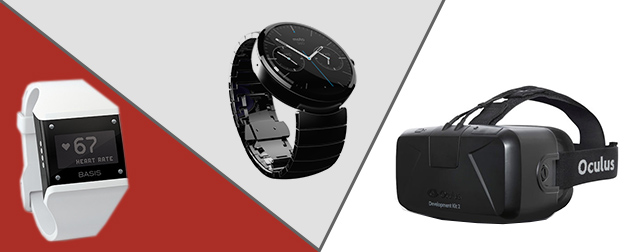Google Announces the Wearable Platform Android Wear
Google has announced its new wearable platform Android Wear, which is aimed to support manufacturers and developers in providing a good user experience with their smartwatches and apps. Android Wear offers a SDK for developers that makes it easy to run their apps on various smartwatch designs (in particular, rectangular vs. round displays) and relies heavily on Google Now, turning the smartwatch into an extension for the information provided by the Android assistant. As such, voice control will play a huge role in interactions with the Android Wear devices. The smartwatches’ microphones will always be listening, waiting for the phrase „OK Google“to relay commands to control functions both on the smartwatch itself as well as on the smartphone. Google already has a wide range of partners planning to build watches based on Android Wear. Motorola and LG have presented their first smartwatches, both to be released later this year. Aside from the major smartphone companies, fashion retail company Fossil was also announced to be one of Google’s partners for Android Wear.
http://www.youtube.com/watch?v=0xQ3y902DEQ
Intel Purchases Basis Science
Basis, maker of the activity tracker Basis Band, has been acquired by Intel for about $100 million. While Basis had negotiated possible acquisitions with several different companies over the past few months, the deal with Intel provides great synergy opportunities for both sides. Jef Holove, former CEO of Basis Science, has become one of the general managers of Intel’s New Devices Group, helping the chipset maker to elaborate its ambitious plans for the wearable market. Under its new owner, Basis will continue to sell and support its activity tracker, giving Intel an immediate entry into the digital fitness and health industry. Jef Holove emphasizes the potential of the deal for Basis: “The acquisition brings access to Intel resources, expertise and global scale as we work together to explore new possibilities of wearable technology. Meanwhile, keeping our existing team intact ensures we can remain focused on our mission of improving the health and well-being of people.”
Sony Presents Its Augmented Reality Headset Morpheus
At the Game Developer Conference (GDC) in San Francisco, Sony recently revealed its long awaited prototype for an augmented reality headset for the Playstation 4. The helmet-like, head-mounted display was presented with the name „Morpheus“,a name adopted from one of the main characters of the science fiction movie trilogy „Matrix“. The version presented at the GDC is an early prototype, currently featuring a 1920*1080 pixel LCD display, which might still be replaced with an OLED display to reduce blurring in the final product. The Morpheus uses blue LED lights for head tracking via the Playstation camera, which also tracks the position of the Playstation gamepad and the Move controllers. Developers were already given the opportunity to test two simulations optimized for the Morpheus at the Game Developer Conference. In its presentation, Sony made clear that the product still had a lot of refinement ahead of it before being ready for sale. A release date and price have not been announced yet and it’s likely the Morpheus won’t hit the shelves until 2015.
Facebook Aquries Virtual Reality Startup Occulus
Just a few days after the Sony announcement, Oculus and Facebook surprised the tech universe. With $2 billion for the augmented reality startup Oculus, Facebook has once again made a significant investment in order to get its hands on one of the most promising future technologies. Oculus, which had its debut with a Kickstarter campaign in 2012, raised $91 million in venture capital in 2013. The $2 billion acquisition got the tech community discussing the impact Facebook might have on the future of virtual reality. Many of the crowdfunders were upset by the social network taking over Oculus, a newcomer they had put high hopes on to create the future of virtual reality together with its community. Michael Abrash, formerly responsible for virtual reality at game developer Valve, will be joining Oculus as Chief Scientist. He praised that the acquisition made clear virtual reality would soon evolve to its full potential, making it the „final Platform“ as Abrash described it.











